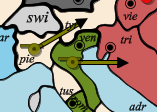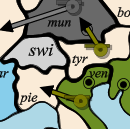Hmm… haven’t had time to blog lately (an eternal lament of the blogosphere, I’m sure). To fix it, a couple of words about a game of Diplomacy we played on Saturday with the kids around here. I’ve played lots of beginner tutorial -type Diplomacy games lately, and this one was no exception. In between me playing Italy and others making a mess of their order sheets we did manage a half-decent bout.
Anyway, I’ll describe my Italian strategy here just for kicks. I’ve played this one a lot lately – it’s not an opening strategy but rather a midgame one, so there’s plenty of variation in how it goes at the beginning. I have a long and glorious history with playing Italy, mainly because I tend to end up as a fill player when others want to play the game. That also means that my Italy is one mean bastard who rarely places anywhere but the highest third. If I may boast myself, that is.
Italy is considered the weakest Power on the board, and with reason: because there are almost no neutral centers nearby (Tunis is not really neutral, so Greece is the only one), Italy has little reason to mobilize in the immediate vicinity of the other Powers. Combine this with a difficult geography and you get a Power that can’t attack anybody without signalling it a year in advance. After playing the chicken game with France for the umpteenth time I certainly will myself never sit as her president and make the foolish mistake of foregoing a fleet build in the Mediterranean until Italy manages to sneak around.
My technique for off-setting this Italian weakness is lots of diplomacy and a mid-term strategy that I call “cha-cha”. There’s a mandatory little dance involved here when describing it to your confounded co-Powers at a live game where you swing your butt and snap your fingers, too. But what is the cha-cha?
“Cha-cha is the strategy of swinging east and west but never settling on either; you have to keep to a rhythm, swinging back and forth and mooning both east and west in turn. Basically, it means that now that I have troops in Tyrol, I’m in perfect position to attack France.” – Italian King Eero, just before not attacking France


 To put that simply, we’re talking of moving Ven-Pie and Pie-Tyr and even Tyr-Pie with two armies that both cover Venice and conquer the local properties for you. Pretty familiar to players of Italy, I imagine. The thing is that there really aren’t any immediate tactical or strategic goals involved in this, except putting your troops in position for some easy property grabs. This is a “many small knives” strategy, so it doesn’t work if your co-players get on a high horse when you improvise; if they’re all about the realpolitik, though, it’s not necessarily problematic. Losing Trieste and suing for peace is better for the Austrian than turning his troops back home and letting the Russian follow them, for example.
To put that simply, we’re talking of moving Ven-Pie and Pie-Tyr and even Tyr-Pie with two armies that both cover Venice and conquer the local properties for you. Pretty familiar to players of Italy, I imagine. The thing is that there really aren’t any immediate tactical or strategic goals involved in this, except putting your troops in position for some easy property grabs. This is a “many small knives” strategy, so it doesn’t work if your co-players get on a high horse when you improvise; if they’re all about the realpolitik, though, it’s not necessarily problematic. Losing Trieste and suing for peace is better for the Austrian than turning his troops back home and letting the Russian follow them, for example.
It is often said that Diplomacy is a game of triangles: the eastern triangle and western triangle have to resolve in elimination of two players before truly global (board-encompassing) maneuvers can commence. Italy has the unique job of trying to slow down this resolution as long as possible, simply because he himself is so bad at mobilizing and forming believable battlefronts. He needs time to bring armies somewhere, and that time is gained by early and mid-game strategical balancing of the interests of other players. Italy has mediocre access to other players, but at least he has access to four of them, two in both triangles. That is enough to make others doubt themselves and to help whoever most needs help at any given time.
Going concrete, what do I recommend: start the game with any opening that does not openly antagonize anybody. Build a good relationship with all four of your neighbours; I don’t mean a coddling relationship of sweet lies, but a factual real-politic working relationship. By all means let each one believe that you want a long-term alliance, but don’t commit to such yet. Wait for them to “prove” that they can survive their more immediate neighbours. This way you build the basis for a long series of betrayals where you let your every neighbor believe that you’re their ally.
Last Saturday I started by taking my Roman army to Greece and my army in Venice to Piedmont. (Both Austria and Turkey supported me to Greece; that tells more of their play than mine, of course.) The army in Piedmont was there just in passing, though; in fall it continued to Tyrol. The idea was that I caused slight worry (and a potential build loss) for France while also reassuring him immediately afterwards by moving away (he was left with the impression that I could be trusted to get involved in the east). Austria was slightly concerned by the army in Tyrol and more concerned when I used the build from Greece to build an army in Venice; he was also rather committed to setting up a defensive boundary against Russia, so he could do little when I annexed Trieste in the spring.
Now, I know that a smart player would probably continue by gobbling up Austria here. He could build momentum and become a believable land-based Power that way. A cha-cha artist, however, will instead plead peace, build a ship and an army (from Tunis and Trieste) , and go a-hunting in France again. Wouldn’t probably work just like that against a more experienced opponent (a beginner’s game, as you remember), but the principle of meddling everywhere is the same.
I ended up spending the next couple of years with one ship basically swinging between the Ionian Sea and Aegean Sea, messing with Turkey and Austria in turn, while the two armies I’d allocated to Austria annexed Vienna as well. Meanwhile I took Portugal in the west, lost it and took Marseille. We had to end the game due to time constraints at year -06, I think, at which point I’d just conquered Budapest. (The tactics of that were fascinating, considering that Russia had conquered it in -03, lost it to Austria in -04 and lost it again in -05. And I still only had the two armies in the area, so I was basicly just playing the neighbors against each other here.) I’d have probably continued by adding one army to my eastern efforts (west was more or less locked down at that point) just to make sure Austria stayed dead and left me to play Russia and Turkey against each other.
The weakness of this strategy is also rather clear when you consider that I didn’t win the game: Germany was played by a young and talented guy with a bit of previous experience, and he tied me at eight centers in the end by building a lot of fleets and landing armies in England. If we’d played two years more, he’d have won the game, as he simply had more robust fronts and an ability to seize centers without petty betrayal and diplomacy. On the other hand, if we’d played ten more years, I think I’d have ultimately had some pretty good chances. End-game consolidation of a cha-cha empire is a bitch, though, so if your opponents realize what you’re doing they can break you the way Italy is always broken: one player ties you in defense of one of your three separate vulnerable borders (really, even Russia only has two) while another comes in from the back and lands on the peninsula.
Even more telling, perhaps, is the state of the other players at the end: England was reduced to banditry in the Nordic area, Russia held only Warsaw and Sevastopol, Turkey had little except his home centers and France had lost Marseille. All of that wasn’t my doing (England really just messed himself up), but a considerable majority of the chaos and weakness of the eastern situation was due to my efforts at destabilizing the area. This destabilization is the key to fighting a war in the west, as you need to stop Turkey and Russia from consolidating early (or even in the mid-game, ideally). Having an army or two in the area helps immensely.
Definitely a fun an effective strategy! By the way, what program are those screen shots from?
It’s JDip. Works passably well for creating Diplomacy maps.
Wish I had this advice when starting this game of diplomacy
http://www.catholicsites.org/diplomacy/game03/
I was on pace to have 8 centers by fall of 1903. I had a solid truce with Austria but Russia had a super secret alliance with Austria and convince Austria to come for my Italy. Cha-cha would have worked well for me in this game. All the elements were right. Hope I draw Italy again to see if I can make it work.